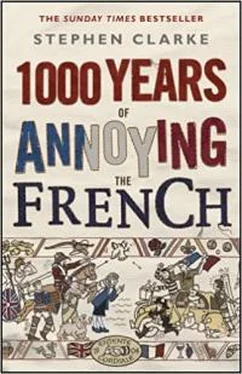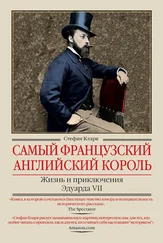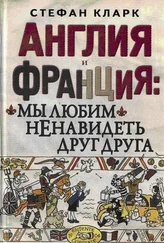Стефан Кларк - 1000 Years of Annoying the French
Здесь есть возможность читать онлайн «Стефан Кларк - 1000 Years of Annoying the French» весь текст электронной книги совершенно бесплатно (целиком полную версию без сокращений). В некоторых случаях можно слушать аудио, скачать через торрент в формате fb2 и присутствует краткое содержание. ISBN: , Издательство: Transworld Digital, Жанр: Старинная литература, на английском языке. Описание произведения, (предисловие) а так же отзывы посетителей доступны на портале библиотеки ЛибКат.
- Название:1000 Years of Annoying the French
- Автор:
- Издательство:Transworld Digital
- Жанр:
- Год:неизвестен
- ISBN:9781407067629
- Рейтинг книги:3 / 5. Голосов: 1
-
Избранное:Добавить в избранное
- Отзывы:
-
Ваша оценка:
- 60
- 1
- 2
- 3
- 4
- 5
1000 Years of Annoying the French: краткое содержание, описание и аннотация
Предлагаем к чтению аннотацию, описание, краткое содержание или предисловие (зависит от того, что написал сам автор книги «1000 Years of Annoying the French»). Если вы не нашли необходимую информацию о книге — напишите в комментариях, мы постараемся отыскать её.
1000 Years of Annoying the French — читать онлайн бесплатно полную книгу (весь текст) целиком
Ниже представлен текст книги, разбитый по страницам. Система сохранения места последней прочитанной страницы, позволяет с удобством читать онлайн бесплатно книгу «1000 Years of Annoying the French», без необходимости каждый раз заново искать на чём Вы остановились. Поставьте закладку, и сможете в любой момент перейти на страницу, на которой закончили чтение.
Интервал:
Закладка:
2
French-bashing in Its Infancy
In the 250 years between the death of William the Conqueror and the Hundred Years War there were, predictably, quite a few historic events. After all, two and a half centuries is about the time that separates the invention of the bicycle and the atomic bomb (yes, just because we’re going forward in time, it doesn’t mean we’re progressing).
There was, for example, the signing of the Magna Carta, the murder of Thomas Becket, and the exploits of legendary heroes like Richard the Lionheart, Robert the Bruce and Robin Hood (the latter being just that, of course – a legend).
Above all, however, this was the time it took for England, which in 1087 was just a Norman colony, to develop to the point where it was nationalistic and powerful enough to turn the tables and attack not only its old colonial masters, but the whole of France.
It was a long process, because for most of that time England’s monarchs acted rather like a teenager from London who has lucked into inheriting the lairdship of a Scottish island – free whisky, cute castle, it’s just a shame about the terrible weather and all these incomprehensible locals. Indeed, several Anglo-Norman kings thought of themselves as Dukes of Normandy with a second home in London, and almost all of them saw England and its peasants as little more than a source of funding for their hobbies, which varied from the boringly normal like hunting and wenching to more exotic pastimes such as crusading in the Med (Richard the Lionheart), architectural follies (Henry III) and thatching houses (Edward II).
But every king 1between 1087 and 1327 contributed, in his own way, to England’s limbering up for the Hundred Years War, even though in some cases they seemed to do it completely by accident …
Fighting for the right to party
Things got off to a slow start because William I’s successor was such a waste of time.
On the Conqueror’s death, his eldest son, Robert, received the Norman homeland. England, meanwhile, was bequeathed to the second surviving son, William II, or Rufus as he was called because of his red face. Yes, England was only a poor second prize in the family lottery.
William Rufus suffered from chronic spoilt-child-with-a-famous-name syndrome, and was a sort of medieval Paris Hilton, sharing – it is alleged – her taste for make-up, dresses and yappy little dogs. He spent most of his short reign (1087–1100) partying in various English castles and over-taxing his people to pay for his lavish lifestyle. He was so unpopular that when he was ‘accidentally’ hit by an arrow through the lung and left to die where he fell, no one even bothered to investigate. It was perhaps fitting that Rufus died while hunting in the New Forest, the tract of land ethnically cleansed of Anglo-Saxons by his father.
The arrow that killed Rufus was rumoured to have been fired on the orders of his younger brother Henry, whose only inheritance in William the Conqueror’s will had been some money with which to buy land. Henry was on Rufus’s fatal hunting trip, and departed hurriedly for no apparent reason shortly before the ‘accident’ happened.
With the English throne vacant, and big brother Robert away on a crusade, Henry immediately stepped in as King Henry I. He was an altogether different ruler. Like Rufus, he enjoyed partying, and is said to have fathered about twenty-five illegitimate children, but he also had a measured political mind – his nickname was ‘Beauclerc’, or ‘Good Scholar’. He saw the importance of uniting the two main peoples in England, and married an Anglo-Saxon, Eadgyth (usually modernized as Edith), a descendant of Alfred the Great and the sister of Edgar the Atheling, the man whom William the Conqueror had prevented from taking over the English Crown after the Battle of Hastings. Interestingly, their wedding took place on 11 November 1100, a date no doubt chosen to give a kind of numerological resonance to the union in those superstitious times.
When England’s Norman nobility complained about Eadgyth’s unpronounceable name, 2Henry I simply changed it to his mother’s Anglo-Norman name, Mathilde.
Henry promised to right all the wrongs of his brother’s reign, and imprisoned Rufus’s chief minister, a rich Norman bishop called Ranulf Flambard (‘Ranulf the Hothead’) who had been in charge of collecting revenue, a task he accomplished brilliantly by selling positions of power in the Church. But Flambard became the first prisoner to escape from the new Tower of London, and fled to Normandy to join Duke Robert, who was back from his crusade and wondering how to seize the throne of England from his uppity little brother Henry.
Robert, whose nickname was ‘Curthose’ (‘Short Trousers’), because of his stumpy legs, was as hotheaded as Flambard, and had spent much of his adult life warring against his father William the Conqueror. The two had even met face to face in battle, with the son flooring his ageing father but sparing his life at the last moment. Egged on by Flambard, in 1101 Robert led a new Norman invasion of England, landing a small army at Portsmouth. However, the English barons who had promised to help him didn’t turn up, because Henry I was becoming a popular king – one of his most astute reforms being a guarantee not to overtax his barons. In the end, the two brothers met in peace, and Robert agreed to renounce his claim in return for a regular income and some of the land Henry owned in Normandy.
But Henry didn’t trust his big brother to respect the agreement, and, proving that England now felt strong enough to take on all-comers, he invaded Normandy. And it went surprisingly smoothly. Henry captured Bayeux and Caen in 1105, returned to England briefly to settle a dispute about whether he or the Pope should nominate English bishops, and then resumed his campaign the following year, finally meeting Robert in battle beside the castle of Tinchebray near Caen on 28 September 1106. Henry defeated the Normans in an hour, and took Robert prisoner.
England had successfully conquered Normandy, exactly forty years to the day after William the Conqueror had landed on English soil – another numerological omen.
Henry I was now as powerful as his father had been, and to make sure he stayed that way, he put his elder brother out of action for good. Robert was thrown into prison, ironically in two Norman castles – at Devizes in Wiltshire and then Cardiff. And, after a failed escape attempt, Henry had Robert’s eyes burnt out, and kept him in captivity for the rest of his life. Fondness for close relatives didn’t seem to figure in those Anglo-Norman genes.
Fishy goings-on in Normandy
By 1135, King Henry I was an old man in his mid-sixties and thinking about his succession. In the autumn of that year, he went to Normandy to visit his daughter Mathilde, who had made an excellent strategic marriage to a Frenchman, Geoffrey, Count of Anjou, who reigned over the lands immediately to the southwest of Henry’s domains in Normandy. Despite the recent births of two grandchildren, relations between father, daughter and son-in-law were strained, perhaps because the King had explained that although Mathilde was his only legitimate heir to the throne of England, she could not inherit the titles because she was an heiress , and at that time the essential qualification to become an English ruler was to possess a penis.
Anyway, after a hard day’s hunting, Henry returned to Mathilde and Geoffrey’s place, le Château de Lyons (at Lyons-la-Forêt in Normandy, not the city of Lyon in central France), where he sat down to one of his favourite meals, a plate of grilled lampreys. These are hideous eel-like creatures with sucker mouths surrounded by pointed teeth that they use to pierce the stomach of their prey and suck its innards out. They are now almost extinct thanks to their preference for unpolluted river water, but in medieval times they were a delicacy, and the city of Gloucester used to give a lamprey pie to the monarch every Christmas. Henry loved them despite their ugliness, and on 1 December 1135 he is said to have consumed such a ‘surfeit of lampreys’ that he died of over-eating.
Читать дальшеИнтервал:
Закладка:
Похожие книги на «1000 Years of Annoying the French»
Представляем Вашему вниманию похожие книги на «1000 Years of Annoying the French» списком для выбора. Мы отобрали схожую по названию и смыслу литературу в надежде предоставить читателям больше вариантов отыскать новые, интересные, ещё непрочитанные произведения.
Обсуждение, отзывы о книге «1000 Years of Annoying the French» и просто собственные мнения читателей. Оставьте ваши комментарии, напишите, что Вы думаете о произведении, его смысле или главных героях. Укажите что конкретно понравилось, а что нет, и почему Вы так считаете.












